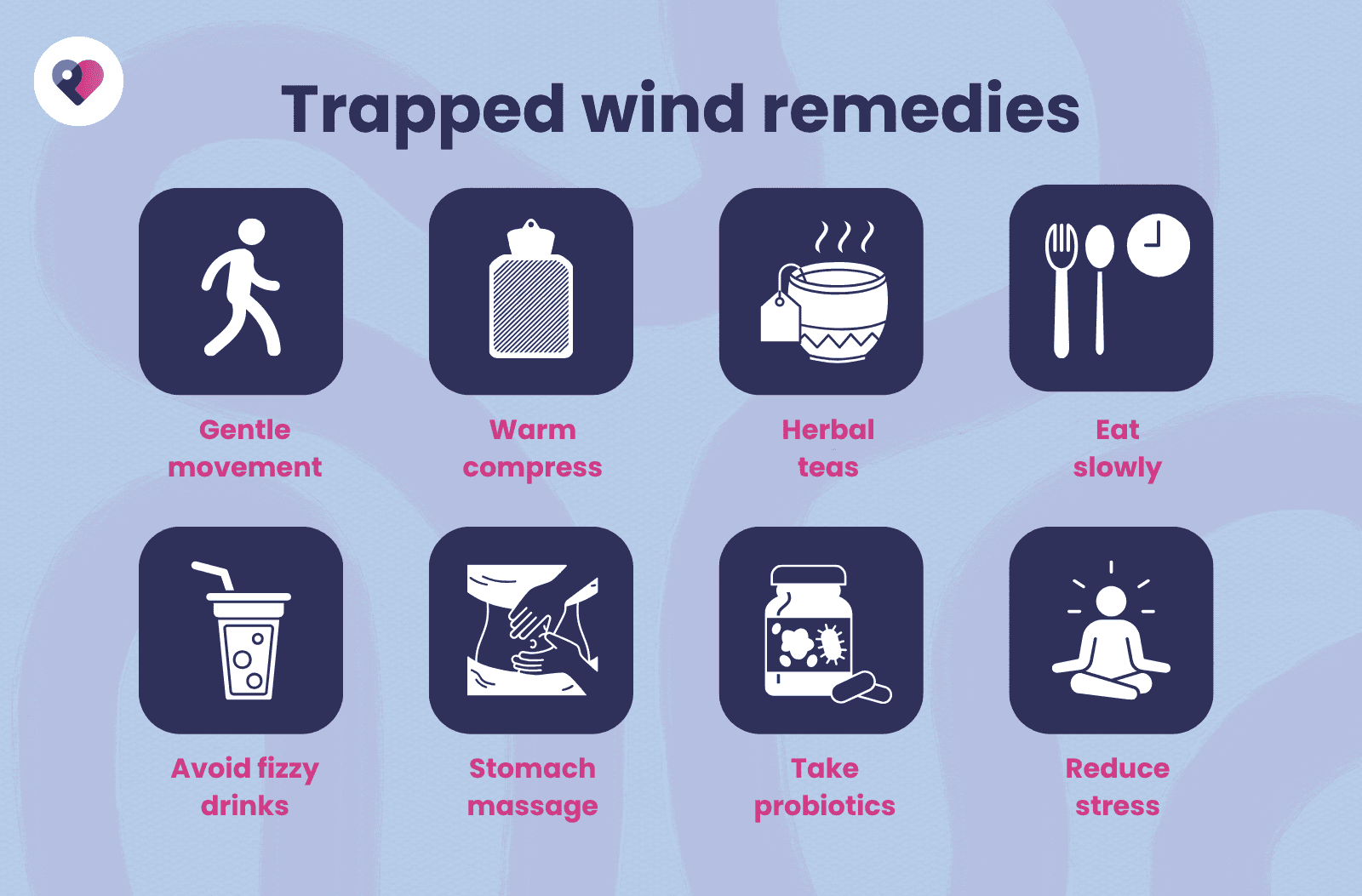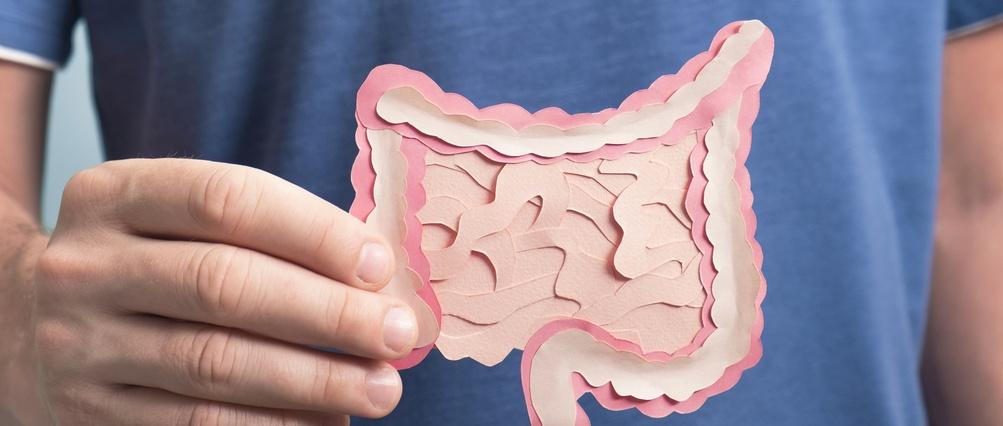
Cómo eliminar los gases atrapados: remedios caseros que funcionan
Peer reviewed by Dr Colin Tidy, MRCGPAuthored by Josh AldermanOriginally published 6 Nov 2025
Satisface las necesidades del paciente directrices editoriales
- DescargarDescargar
- Compartir
- Idioma
- Debate
Most people experience trapped wind from time to time. It’s that bloated, uncomfortable feeling in your stomach or chest that just won’t shift. It’s usually harmless, but it can be embarrassing and sometimes quite painful.
The good news is that a few simple home remedies and lifestyle tweaks can make a big difference.
En este artículo:
Trapped wind happens when gas builds up in your digestive system. This can come from swallowing air when you eat or drink, or as a by-product of digestion when food breaks down in your gut.
Knowing what causes trapped wind can help you choose the right remedies to get rid of it.
Trapped wind remedies

Seguir leyendo
Home remedies for trapped wind
1. Gentle movement
Light exercise such as walking or stretching can help move gas through your digestive tract, providing quick relief. Yoga poses such as ‘wind-relieving pose’ - aptly named - can be particularly effective.
Even a short 10-minute walk after meals can help your body process food and reduce bloating.
2. Warm compress
A warm compress or hot water bottle placed on your stomach can help relax your muscles and reduce discomfort.
The warmth improves blood flow to the area, making it easier for gas to move through your gut.1
3. Herbal teas
Certain herbal teas are known for easing digestive discomfort. Peppermint, chamomile, fennel, and ginger teas can help relax your digestive system and reduce bloating.2
Sip slowly after meals for the best results.
4. Avoiding fizzy drinks and chewing gum
Carbonated drinks introduce extra air into your digestive system, while chewing gum can cause you to swallow air. Both can worsen trapped wind and bloating.
Try replacing fizzy drinks with still water and skip the gum if you’re prone to bloating.
5. Eating more slowly
Rushing your meals or eating on the go means you’re likely swallowing air along with your food. Take smaller bites, chew thoroughly, and try not to talk while eating.
This simple change can reduce the amount of air in your digestive system.
6. Massaging your abdomen
Gently massaging your abdomen in a circular motion can encourage trapped gas to move through your intestines.
Start on the lower right side of your stomach and move up, across, and down again in the direction of your colon.
7. Adjusting your diet
If you frequently experience trapped wind, consider keeping a food diary to identify triggers, and adjust your diet accordingly. Reducing your intake of high-fibre foods, dairy, or artificial sweeteners - such as sorbitol - may also help.3
You might also try smaller, more frequent meals rather than large ones, which can be easier for your body to digest.
8. Probiotics
Probiotics are live bacteria that support gut health and may reduce symptoms such as bloating and trapped wind, particularly in people with IBS.
You can find probiotics in yoghurts, fermented foods such as kefir or sauerkraut, or in supplement form.
9. Over-the-counter remedies
If lifestyle changes aren’t enough, over-the-counter products containing simeticone (an anti-foaming agent) can help break down gas bubbles in your gut, making them easier to pass.
Speak to your pharmacist about which options are suitable for you.
10. Managing anxiety
Stress and anxiety can affect your digestive system, sometimes worsening trapped wind.
Relaxation techniques such as deep breathing, mindfulness, or gentle exercise can help calm your digestive system and reduce symptoms.
When to see a doctor for trapped wind
Trapped wind is usually nothing to worry about, but if your symptoms are frequent, severe, or accompanied by other issues like weight loss, being sick (vomiting), or changes in your bowel habits, speak to your doctor.
These could be signs of an underlying digestive condition such as IBS, coeliac disease, or an infection.
Resumen
Back to contentsTrapped wind can often be relieved with simple home remedies. Moving your body, warm compresses, and herbal teas such as peppermint or ginger help ease bloating and move trapped gas through your digestive system.
Eating slowly, avoiding fizzy drinks, and gentle abdominal massage can also reduce discomfort.
If your symptoms persist or you’re unsure what’s causing them, speak with a healthcare professional for advice.
Managing trapped wind effectively is often about understanding your body - and giving your digestive system the support it needs to function smoothly.
Seguir leyendo
Para saber más
Back to contentsSelección de pacientes para Salud digestiva general

Dieta y nutrición
¿Qué es su microbioma intestinal?
Hablemos de algo pequeño que tiene un gran impacto en su salud: el microbioma intestinal. Este universo oculto de microbios desempeña un papel importante en su bienestar. La forma en que tratas a estos pequeños habitantes puede marcar una gran diferencia en cómo te sientes.
por Victoria Raw

Salud digestiva
¿Cuál es la relación entre el SII y la ansiedad?
El síndrome del intestino irritable (SII) puede provocar una combinación de retortijones, diarrea, hinchazón y estreñimiento. Es un problema de salud a largo plazo que puede afectar a la calidad de vida. Aunque cambiar la dieta y tomar ciertos medicamentos puede ayudar, una mala salud mental y los síntomas del SII pueden agravarse mutuamente.
por Victoria Raw
Seguir leyendo
Historia del artículo
La información de esta página ha sido revisada por médicos cualificados.
Próxima revisión prevista: 6 de noviembre 2025
6 Nov 2025 | Publicado originalmente
Autores:
Josh AldermanRevisado por expertos
Dr. Colin Tidy, MRCGP

Pregunte, comparta, conecte.
Explore debates, formule preguntas y comparta experiencias sobre cientos de temas de salud.

¿Se encuentra mal?
Evalúe sus síntomas en línea de forma gratuita
Suscríbase al boletín informativo para pacientes.
Tu dosis semanal de consejos de salud claros y fiables, redactados para ayudarte a sentirte informado, seguro y en control.
Al suscribirte, aceptas nuestra Política de privacidad. Puedes darte de baja en cualquier momento. Nunca vendemos tus datos.